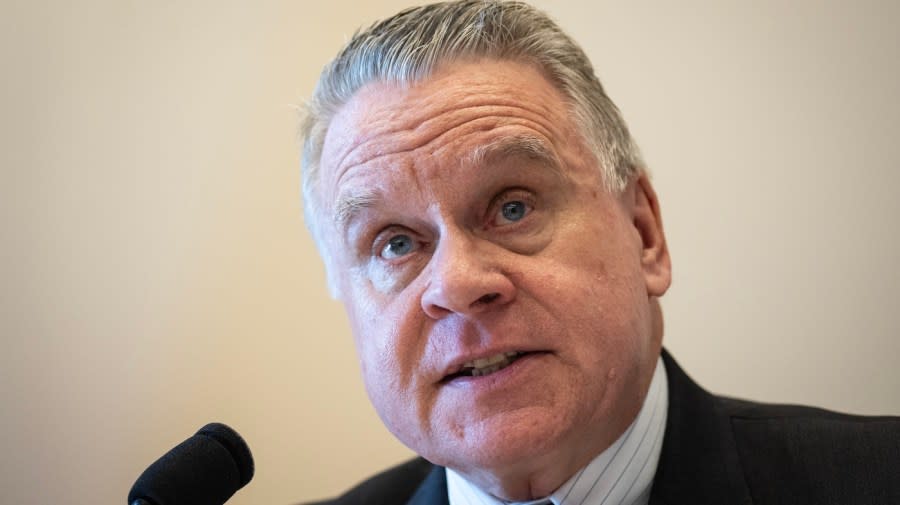Republican lawmaker introduces bill to block all funds for UN Palestinian aid agency

- Oops!Something went wrong.Please try again later.
A Republican lawmaker has introduced legislation to permanently block the United States from providing funds for the United Nations agency supporting Palestinian refugees.
Rep. Chris Smith (R-N.J.), a senior member of the House Foreign Affairs Committee, introduced the legislation after the Biden administration suspended new funding amid allegations that 12 staff of the UN body participated in Hamas’s Oct 7 terrorist attacks against Israel.
The Biden decision has come under criticism from progressive Democrats and aid organizations because of the critical role the body plays in providing aid to Gaza. At least nine countries have paused funding for the organization and UNRWA has warned that it may be forced to end its assistance to 2 million Palestinians in Gaza.
Smith’s legislation is titled “Stop Support for UNRWA Act of 2024,” and the purpose of the legislation is described as prohibiting “aid that will benefit Hamas and for other purposes.”
Republicans have expressed concern that the U.N. body has not done enough to address antisemitism and is set to hold a subcommittee hearing on the matter. Smith chairs the House Foreign Affairs subcommittee on Global Health, Global Human Rights and International Organizations.
The bill would prohibit the U.S. from making “any voluntary or involuntary contributions to the United Nations Relief and Works Agency for Palestine Refugees in the Near East (UNRWA) to any successor or related entity, or to the regular budget of the United Nations for the support of UNRWA or a successor entity.”
UNRWA was established in 1949 to provide aid for Palestinian Arabs displaced amid the wars that resulted in the creation of the State of Israel, but that has expanded to provide economic assistance, education, housing, health services to descendants and their families.
While UNRWA services Palestinian refugees across the Middle East, it is viewed as a critical organization in the Gaza Strip, with more than half the population using its services before the current war between Israel and Hamas, employing 13,000 people, and one of the few, best placed aid organizations to help deliver assistance amid the conflict and a spiraling humanitarian crisis.
But critics say Israeli allegations that 12 UNRWA employees took part in Hamas’s shocking attack against Israel on Oct. 7 validate long-held criticisms against the organization, that it fosters antisemitism in its teaching materials, employs Hamas sympathizers, and benefits the U.S.-designated terrorist organization.
UNRWA’s commissioner-general said an investigation is being launched into the allegations and terminated the contracts of nine of the employees, saying one of those accused is dead and the identities of two others are being confirmed.
Smith called President Biden’s pausing of funds for UNRWA “a long overdue response,” in remarks prepared for the House subcommittee hearing.
“Going far beyond the revelations of the last week, there has long been massive and irrefutable evidence of UNRWA’s extensive connivance, complicity, and cooperation in Hamas’s antisemitic genocidal hate campaign,” said Smith.
Smith’s bill could garner wide support in the Republican-controlled House, with GOP lawmakers among the fiercest critics of UNRWA’s mandate, but would likely face opposition in the Democrat-controlled Senate, which generally view the benefit of the organization outweighing its faults.
Former President Trump withdrew U.S. funding for UNRWA in 2018, but it was reinstated by the Biden administration.
Senator Jim Risch (R-Idaho) sought to block $75 million in funding for UNRWA in 2023, but was also overruled by the Biden administration amid alarm among the organization and aid agencies that the funding shortfall would deprive those in need of critical assistance, in particular food.
The U.S. is the largest donor for UNRWA. In 2023, the Biden administration had responded to UNRWA funding appeals and provided $422 million to address the needs of Palestinian refugees in Gaza, the West Bank, Jordan, Lebanon, and Syria.
For the latest news, weather, sports, and streaming video, head to The Hill.

